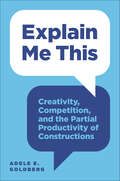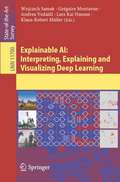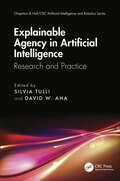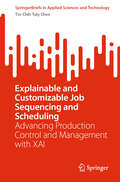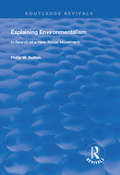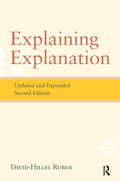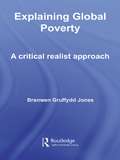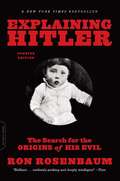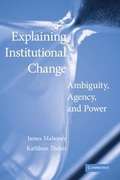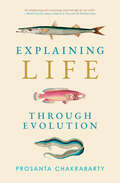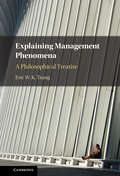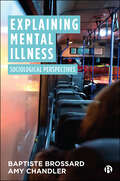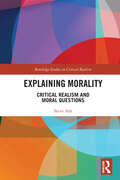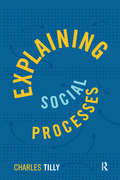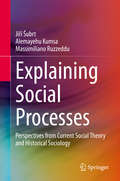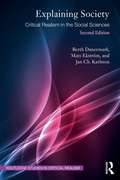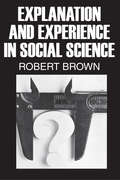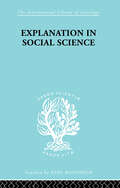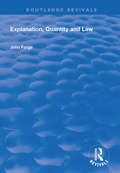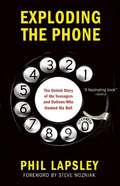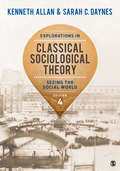- Table View
- List View
Explain Me This: Creativity, Competition, and the Partial Productivity of Constructions
by Adele E. GoldbergWhy our use of language is highly creative yet also constrainedWe use words and phrases creatively to express ourselves in ever-changing contexts, readily extending language constructions in new ways. Yet native speakers also implicitly know when a creative and easily interpretable formulation—such as “Explain me this” or “She considered to go”—doesn’t sound quite right. In this incisive book, Adele Goldberg explores how these creative but constrained language skills emerge from a combination of general cognitive mechanisms and experience. Shedding critical light on an enduring linguistic paradox, Goldberg demonstrates how words and abstract constructions are generalized and constrained in the same ways. When learning language, we record partially abstracted tokens of language within the high-dimensional conceptual space that is used when we speak or listen. Our implicit knowledge of language includes dimensions related to form, function, and social context. At the same time, abstract memory traces of linguistic usage-events cluster together on a subset of dimensions, with overlapping aspects strengthened via repetition. In this way, dynamic categories that correspond to words and abstract constructions emerge from partially overlapping memory traces, and as a result, distinct words and constructions compete with one another each time we select them to express our intended messages.While much of the research on this puzzle has favored semantic or functional explanations over statistical ones, Goldberg’s approach stresses that both the functional and statistical aspects of constructions emerge from the same learning mechanisms.
Explainable AI: Interpreting, Explaining and Visualizing Deep Learning (Lecture Notes in Computer Science #11700)
by Klaus-Robert Müller Grégoire Montavon Wojciech Samek Andrea Vedaldi Lars Kai HansenThe development of “intelligent” systems that can take decisions and perform autonomously might lead to faster and more consistent decisions. A limiting factor for a broader adoption of AI technology is the inherent risks that come with giving up human control and oversight to “intelligent” machines. For sensitive tasks involving critical infrastructures and affecting human well-being or health, it is crucial to limit the possibility of improper, non-robust and unsafe decisions and actions. Before deploying an AI system, we see a strong need to validate its behavior, and thus establish guarantees that it will continue to perform as expected when deployed in a real-world environment. In pursuit of that objective, ways for humans to verify the agreement between the AI decision structure and their own ground-truth knowledge have been explored. Explainable AI (XAI) has developed as a subfield of AI, focused on exposing complex AI models to humans in a systematic and interpretable manner. The 22 chapters included in this book provide a timely snapshot of algorithms, theory, and applications of interpretable and explainable AI and AI techniques that have been proposed recently reflecting the current discourse in this field and providing directions of future development. The book is organized in six parts: towards AI transparency; methods for interpreting AI systems; explaining the decisions of AI systems; evaluating interpretability and explanations; applications of explainable AI; and software for explainable AI.
Explainable Agency in Artificial Intelligence: Research and Practice (Chapman & Hall/CRC Artificial Intelligence and Robotics Series)
by David W. Aha Silvia TulliThis book focuses on a subtopic of explainable AI (XAI) called explainable agency (EA), which involves producing records of decisions made during an agent’s reasoning, summarizing its behavior in human-accessible terms, and providing answers to questions about specific choices and the reasons for them. We distinguish explainable agency from interpretable machine learning (IML), another branch of XAI that focuses on providing insight (typically, for an ML expert) concerning a learned model and its decisions. In contrast, explainable agency typically involves a broader set of AI-enabled techniques, systems, and stakeholders (e.g., end users), where the explanations provided by EA agents are best evaluated in the context of human subject studies. The chapters of this book explore the concept of endowing intelligent agents with explainable agency, which is crucial for agents to be trusted by humans in critical domains such as finance, self-driving vehicles, and military operations. This book presents the work of researchers from a variety of perspectives and describes challenges, recent research results, lessons learned from applications, and recommendations for future research directions in EA. The historical perspectives of explainable agency and the importance of interactivity in explainable systems are also discussed. Ultimately, this book aims to contribute to the successful partnership between humans and AI systems. Features: • Contributes to the topic of explainable artificial intelligence (XAI) • Focuses on the XAI subtopic of explainable agency • Includes an introductory chapter, a survey, and five other original contributions
Explainable and Customizable Job Sequencing and Scheduling: Advancing Production Control and Management with XAI (SpringerBriefs in Applied Sciences and Technology)
by Tin-Chih Toly ChenThis book systematically reviews the progress in explainable AI (XAI) and introduces the methods, tools, and applications of XAI technologies in job sequencing and scheduling. Relevant references and real case studies are provided as supporting evidence. To date, artificial intelligence (AI) technologies have been widely applied in job sequencing and scheduling. However, some advanced AI methods are not easy to understand or communicate, especially for factory workers with insufficient background knowledge of AI. This undoubtedly limits the practicability of these methods. To address this issue, explainable AI has been considered a viable strategy. XAI methods suitable for job sequencing and scheduling differ from those for other fields in manufacturing, such as pattern recognition, defect analysis, estimation, and prediction. This is the first book to systematically integrate current knowledge in XAI and demonstrate its application to manufacturing.
Explaining Environmentalism: In Search of a New Social Movement
by Philip W. SuttonThis title was first published in 2000: The author examines those current theories which purport to explain the emergence and character of 'new' social movements in the 'advanced' industrial societies since the 1960s. In particular, it sets out to test the efficacy of these explanations in relation to the history of the environmental movement in Britain. The book breaks new ground in bringing together both short-term and the more historically orientated long-term explanations into a single volume, thus providing an invaluable resource for students of social movements. Its critical exposition of major theories also points to the need for a more developmental approach which seeks to connect old and new movement forms, thus allowing for a more balanced evaluation of the potential of the environmental movement to bring about significant social change.
Explaining Explanation (Problems Of Philosophy Ser.)
by David-Hillel RubenThis second edition of David-Hillel Ruben's influential and highly acclaimed book on the philosophy of explanation has been revised and expanded, and the author has made substantial changes in light of the extensive reviews the first edition received. Ruben's views on the place of laws in explanation has been refined and clarified. What is perhaps the central thesis of the book, his realist view of explanation, describing the way in which explanation depends on metaphysics, has been updated and extended and engages with some of the work in this area published since the book's first edition.
Explaining Global Poverty: A Critical Realist Approach (Routledge Studies in Critical Realism)
by Branwen Gruffydd JonesThe twenty-first century is characterized by extremes of poverty and wealth, of scarcity and abundance. The vast inequalties of wealth distribution between the developed west and the impoverished developing world is a complex problem. This book recognises that Africa in particular has manifested this global disgrace and symbolizes the nature of poverty to the western world. In order to truly emancipate the poverty stricken around the world we must necessarily understand the reasons for its existence. In a departure from traditional critical realist theory, Gruffydd-Jones argues the benefits of reassessing the relevance of objective inquiry and emphasizes its primacy over normative theory in the battle to truly understand the reasons for the African crisis. This approach brings us a book of real relevance for inequality in the modern world and gives us an important platform from which to move forwards in the fight against poverty.
Explaining Hitler: The Search for the Origins of His Evil, updated edition
by Ron RosenbaumIn Explaining Hitler, Ron Rosenbaum investigates the meanings and motivations people have attached to Hitler and his crimes against humanity. What does Hitler tell us about the nature of evil? In often dramatic encounters, Rosenbaum confronts historians, scholars, filmmakers, and deniers as he skeptically analyzes the key strains of Hitler interpretation. A balanced and thoughtful overview of a subject both frightening and profound, this is an extraordinary quest, an expedition into the war zone of Hitler theories, "a provocative work of cultural history that is as compelling as it is thoughtful, as readable as it is smart” (New York Times). First published in 1998 to rave reviews, Explaining Hitler became a New York Times-bestseller. This new edition is an update of that classic and a critically important contribution to the study of the twentieth century’s darkest moment.
Explaining Institutional Change: Ambiguity, Agency, and Power
by James Mahoney Kathleen ThelenThis book contributes to emerging debates in political science and sociology on institutional change. Its introductory essay proposes a new framework for analyzing incremental change that is grounded in a power-distributional view of institutions and that emphasizes ongoing struggles within but also over prevailing institutional arrangements. Five empirical essays then bring the general theory to life by evaluating its causal propositions in the context of sustained analyses of specific instances of incremental change. These essays range widely across substantive topics and across times and places, including cases from the United States, Africa, Latin America, and Asia. The book closes with a chapter reflecting on the possibilities for productive exchange in the analysis of change among scholars associated with different theoretical approaches to institutions.
Explaining Life through Evolution
by Prosanta ChakrabartyA broad overview of the science of evolution, and why understanding it matters in our everyday lives.Explaining Life through Evolution tells the origin story of life on this planet and how we arrived at the tremendous diversity among organisms that we see around us today. Prosanta Chakrabarty explains evolution in a concise, accessible, and engaging way, emphasizing the importance of understanding evolution in everyday contemporary life. Weaving his own lived experience among discussions of Darwin and the origins of evolutionary thought, Chakrabarty also covers key concepts to our understanding of our current condition, including mutation; the spectrum of race, sex, gender, and sexuality; the limitations of ancestry tests; and the evolution of viruses like SARS-CoV-2, the virus at the heart of the COVID-19 pandemic.Offering a contemporary update to classic popular evolution books by Stephen Jay Gould, Jerry Coyne, and others, Explaining Life through Evolution is not only an illuminating read, but also an essential guide to the kind of scientific literacy that we need in order to face the challenges of our collective future.
Explaining Management Phenomena: A Philosophical Treatise
by Eric W. TsangOne key objective of management research is to explain business phenomena. Yet understanding the nature of explanation is essentially a topic in philosophy. This is the first book that bridges the gap between a technical, philosophical treatment of the topic and the more practical needs of management scholars, as well as others across the social sciences. It explores how management phenomena can be explained from a philosophical perspective, and renders sophisticated philosophical arguments understandable by readers without specialized training. Covering virtually all the major aspects of the nature of explanation, this work will enhance empirical and theoretical research, as well as approaches combining the two. With many examples from management literature and business news, this study helps scholars in those fields to improve their research outcomes.
Explaining Mental Illness: Sociological Perspectives
by Amy Chandler Baptiste BrossardHow can sociology explain the emergence of mental disorders in societies or individuals? This authoritative book makes a case for the renewal of the sociology of mental illness, proposing a reorganisation of this field around four areas: social stratification, stress, labelling and culture. Drawing on case studies from a range of global contexts, the book argues that current research focuses on identifying ‘social factors’, leaving the question of causality to psychiatry, while significant critical perspectives remain untapped. The result is an unprecedented resource that maps the current state of sociology of mental health, providing an invigorating manifesto for its future.
Explaining Morality: Critical Realism and Moral Questions (Routledge Studies in Critical Realism)
by Steve AshAdopting a critical realist approach to morality, this book considers morality as an aspect of social reality, enquiring into the nature of moral agency and asking whether we can legitimately argue for a specific moral position and whether moral positions can be understood to apply universally. Drawing on the thought of Bhaskar, Collier and Sayer, it explores a series of ontological questions about morality, shedding light on the ways in which critical realism can be used to address them, ultimately responding to the question of whether critical realism and the moral theories that have been produced through its use can provide an explanation of morality as a feature of reality. Through a synthesis of realist thought, the author develops a comprehensive theoretical understanding of morality that can be tested for its explanatory power through subsequent practical research. As such, it will appeal to scholars of philosophy and social science with interests in critical realism, ontology and meta-ethics.
Explaining Social Processes
by Charles TillyBuilt upon decades of experience at the frontiers of history and social science, Charles Tilly's newest book offers innovative methods and approaches that are applicable in a wide range of disciplines: politics, sociology, anthropology, history, economics, and more. The book covers approaches to analysis ranging from interpersonal exchanges to world-historical changes-economic, political, and social. He shows how a thoroughgoing relational account of social processes, coupled with the careful identification of causal mechanisms, illuminates variation and change in the ways people live at the small scale and the large.
Explaining Social Processes: Perspectives from Current Social Theory and Historical Sociology
by Jiří Šubrt Alemayehu Kumsa Massimiliano RuzzedduThis textbook considers understanding social processes to be the main task of sociology. From this perspective its authors demonstrate and explain problems which they consider to be crucial for contemporary social science. These are topics of a theoretical and epistemological nature, which are nevertheless closely connected with social development and issues arising from it. The book moves from the more general theoretical questions and dilemmas raised by key social thinkers, such as those connected with the concepts of actor, agency, institutions, structures and systems. It then leads to theoretical reflections on long-term developmental processes associated with the phenomena of power and life in current societies, including globalization, identities, migration, etc. It provides a comprehensive approach to the essential questions of sociology. Lucidly written and including the latest sociological perspectives, this book will find wide appeal among social science students and researchers, and is also for the socially aware general reader.
Explaining Society: Critical Realism in the Social Sciences (Routledge Studies in Critical Realism)
by Jan Ch. Karlsson Berth Danermark Mats EkströmFully revised, with an updated bibliography and new, relevant illustrative examples based on work inspired by critical realism, this new edition of Explaining Society constitutes an up-to-date resource connecting methodology, theory, and empirical research. Including discussions of more recent scholarship in the field which connects critical realism with interdisciplinary research, this second edition also clarifies concepts – such as retroduction and retrodiction – so as to render them consistent with developments within critical realism, which are covered in a new chapter. An accessible account of the nature of society and social science, together with the methods used to study and explain social phenomena, Explaining Society will appeal to scholars of sociology, philosophy, and the social sciences more broadly.
Explanation and Experience in Social Science
by Robert BrownAccording to their critics, social scientists rarely ask the right questions and cannot provide satisfactory answers even to the questions they ask themselves. Social scientists often discuss the nature of knowledge in their fields with a notable lack of clarity. Explanation and Experience in Social Science by Robert Brown dispels the confusion with cogency and wit; it is a systematic, sensible, and lucid analysis of the nature of the explanations put forward by social scientists.Explanation-making is first distinguished from "describing" and "reporting," and then classified into different types, based on different kinds of information used. The greater part of the book consists in discussion and examination of these types of explanation and their relationships, in which the usefulness and limitations of each are assessed. An extraordinary variety of examples from contemporary work in all the social sciences is used, including the fields of sociology, anthropology, psychology, history, demography, political science. and economics. The author makes it clear that good social explanation is possible and that it conforms to the requirements of all good scientific explanation.Explanation and Experience in Social Science is of interest to the practicing scientist--in fact--it is a must-have for any personal or public library with collections in the social sciences. Most studies in the philosophy of the sciences, natural and social, fall into two distinct groups: those written by philosophers for other philosophers and those produced by scientists for their fellow-scientists. The aim of this book is to discuss questions of philosophical interest as they come to be imbedded in the work of social scientists.
Explanation and Proof in Mathematics
by Helmut Pulte Hans Niels Jahnke Gila HannaIn the four decades since Imre Lakatos declared mathematics a "quasi-empirical science," increasing attention has been paid to the process of proof and argumentation in the field -- a development paralleled by the rise of computer technology and the mounting interest in the logical underpinnings of mathematics. Explanantion and Proof in Mathematics assembles perspectives from mathematics education and from the philosophy and history of mathematics to strengthen mutual awareness and share recent findings and advances in their interrelated fields. With examples ranging from the geometrists of the 17th century and ancient Chinese algorithms to cognitive psychology and current educational practice, contributors explore the role of refutation in generating proofs, the varied links between experiment and deduction, the use of diagrammatic thinking in addition to pure logic, and the uses of proof in mathematics education (including a critique of "authoritative" versus "authoritarian" teaching styles). A sampling of the coverage: The conjoint origins of proof and theoretical physics in ancient Greece. Proof as bearers of mathematical knowledge. Bridging knowing and proving in mathematical reasoning. The role of mathematics in long-term cognitive development of reasoning. Proof as experiment in the work of Wittgenstein. Relationships between mathematical proof, problem-solving, and explanation. Explanation and Proof in Mathematics is certain to attract a wide range of readers, including mathematicians, mathematics education professionals, researchers, students, and philosophers and historians of mathematics.
Explanation in Social Science (International Library of Sociology)
by Robert BrownFirst published in 1998. Routledge is an imprint of Taylor & Francis, an informa company.
Explanation, Quantity and Law (Routledge Revivals)
by John ForgePublished in 1999, this work sets out to give an account of explanation which is adequate to the problems that arise when looking at physical science. It offers a theory of explanation with supporting analysis, and also an application to the task of giving an account of explanation in quantum mechanics.
Exploding the Phone: The Untold Story of the Teenagers and Outlaws Who Hacked Ma Bell
by Philip LapsleyBefore smartphones, back even before the Internet and personal computer, a misfit group of technophiles, blind teenagers, hippies, and outlaws figured out how to hack the world's largest machine: the telephone system. Starting with Alexander Graham Bell's revolutionary "harmonic telegraph," by the middle of the twentieth century the phone system had grown into something extraordinary, a web of cutting-edge switching machines and human operators that linked together millions of people like never before. But the network had a billion-dollar flaw, and once people discovered it, things would never be the same. Exploding the Phone tells this story in full for the first time. It traces the birth of long-distance communication and the telephone, the rise of AT&T's monopoly, the creation of the sophisticated machines that made it all work, and the discovery of Ma Bell's Achilles' heel. Phil Lapsley expertly weaves together the clandestine underground of "phone phreaks" who turned the network into their electronic playground, the mobsters who exploited its flaws to avoid the feds, the explosion of telephone hacking in the counterculture, and the war between the phreaks, the phone company, and the FBI. The product of extensive original research,Exploding the Phone is a ground-breaking, captivating book.
Exploited: The heartbreaking true story of a teenage girl trapped in a world of abuse and violence
by Maggie HartleyFourteen-year-old Hannah comes to live with foster carer Maggie Hartley after her mum pleads with Social Services to take her into care, unable to cope with her daughter anymore. Previously a good student, a loving daughter and sister, Hannah is now playing truant, drinking, and taking drugs. Angry and mistrustful, it seems that nobody can reach this troubled teenager.Maggie is used to difficult teenagers, but Hannah's behaviour brings into question everything Maggie has ever learnt in all her years as a foster carer. Determined to push away everyone around her away, Hannah's life seems to be spiralling out of control. But when Hannah finally breaks down and confides a shocking secret to Maggie, the truth behind her chaotic behaviour is finally revealed. Can Maggie help this vulnerable young girl overcome the trauma of what's happened to her and set her free from the demons that haunt her?
Exploited: The heartbreaking true story of a teenage girl trapped in a world of abuse and violence (A Maggie Hartley Foster Carer Story)
by Maggie HartleyFourteen-year-old Hannah comes to live with foster carer Maggie Hartley after her mum pleads with Social Services to take her into care, unable to cope with her daughter anymore. Previously a good student, a loving daughter and sister, Hannah is now playing truant, drinking, and taking drugs. Angry and mistrustful, it seems that nobody can reach this troubled teenager.Maggie is used to difficult teenagers, but Hannah's behaviour brings into question everything Maggie has ever learnt in all her years as a foster carer. Determined to push away everyone around her away, Hannah's life seems to be spiralling out of control. But when Hannah finally breaks down and confides a shocking secret to Maggie, the truth behind her chaotic behaviour is finally revealed. Can Maggie help this vulnerable young girl overcome the trauma of what's happened to her and set her free from the demons that haunt her?
Explorations in Classical Sociological Theory: Seeing the Social World
by Kenneth Allan Sarah DaynesPraised for its conversational tone, personal examples, and helpful pedagogical tools, the Fourth Edition of Explorations in Classical Sociological Theory: Seeing the Social World is organized around the modern ideas of progress, knowledge, and democracy. With this historical thread woven throughout the chapters, the book presents a diverse selection of major classical theorists including Marx, Spencer, Durkheim, Weber, Mead, Simmel, Martineau, Gilman, Douglass, Du Bois, Parsons, and the Frankfurt School. Kenneth Allan and new co-author Sarah Daynes focus on the specific views of each theorist, rather than schools of thought, and highlight modernity and postmodernity to help contemporary readers understand how classical sociological theory applies to their lives.
Explorations in Classical Sociological Theory: Seeing the Social World
by Kenneth Allan Sarah DaynesPraised for its conversational tone, personal examples, and helpful pedagogical tools, the Fourth Edition of Explorations in Classical Sociological Theory: Seeing the Social World is organized around the modern ideas of progress, knowledge, and democracy. With this historical thread woven throughout the chapters, the book presents a diverse selection of major classical theorists including Marx, Spencer, Durkheim, Weber, Mead, Simmel, Martineau, Gilman, Douglass, Du Bois, Parsons, and the Frankfurt School. Kenneth Allan and new co-author Sarah Daynes focus on the specific views of each theorist, rather than schools of thought, and highlight modernity and postmodernity to help contemporary readers understand how classical sociological theory applies to their lives.
